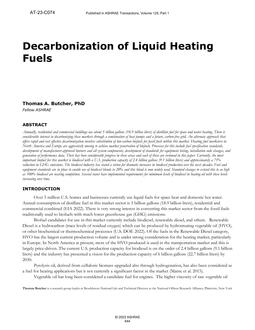Click here to purchase
Annually, residential and commercial buildings use about 5 billion gallons (18.9 billion liters) of distillate fuel for space and water heating. There is considerable interest in decarbonizing these markets through a combination of heat pumps and a future, carbon-free grid. An alternate approach that offers rapid and cost effective decarbonization involves substitution of low-carbon biofuels for fossil fuels within this market. Heating fuel marketers in North America and Europe are aggressively moving to achieve market penetration of biofuels. Processes for this include fuel specification standards, development of manufacturer-approved burners and all system components, development of standards for equipment listing, installation code changes, and generation of performance data. There has been considerable progress in these areas and each of these are reviewed in this paper. Currently, the most important biofuel for this market is biodiesel with a U.S. production capacity of 2.4 billion gallons (9.1 billion liters) and approximately a 75% reduction in GHG emissions. The biodiesel industry has stated a vision for dramatic increases in biodiesel production over the next decades. Fuel and equipment standards are in place to enable use of biodiesel blends to 20% and this blend is now widely used. Standard changes to extend this to as high as 100% biodiesel are nearing completion. Several states have implemented requirements for minimum levels of biodiesel in heating oil with these levels increasing over time.
Product Details
- Published:
- 2023
- Number of Pages:
- 7
- Units of Measure:
- Dual
- File Size:
- 1 file , 1.4 MB
- Product Code(s):
- D-AT-23-C074
- Note:
- This product is unavailable in Russia, Belarus
